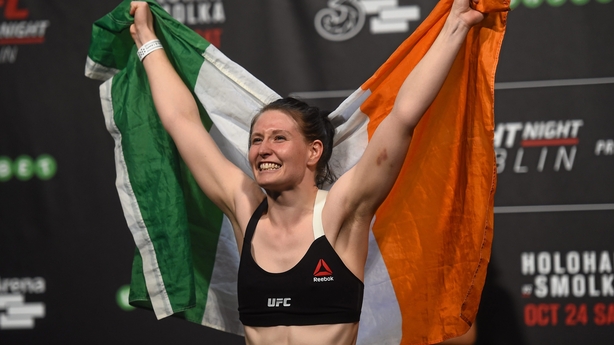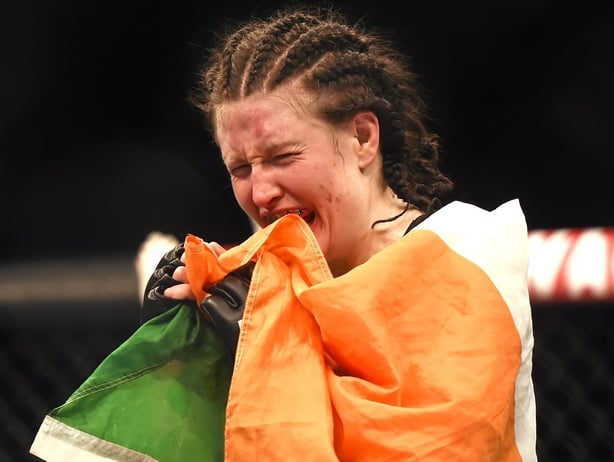2022 is shaping up to be a banner year for Ireland's female mixed-martial-arts fighters.
Last month, 21-year-old Dubliner Nadine Abbott-Bissett became the amateur atomweight world champion.
This weekend, Leah McCourt and Sinead Kavanagh will take centre stage at the 3 Arena for the most eagerly anticipated all-Irish clash in years.
Something that Abbott-Bissett, McCourt and Kavanagh all shared from their early days in the sport is the knowledge that an Irish woman could rise through the ranks, become a champion and fight on the biggest stages in the world.
The woman who inspired them, of course, is Aisling Daly.
Before Conor McGregor was calling for "60 gs, baby"; before the UFC had ever allowed women to fight in the Octagon; 'Ais The Bash' was leading the line for the Irish scene.
In the same building that McCourt and Kavanagh will face off in, Daly claimed the sole win for SBG Ireland at 2015's UFC Dublin following an emotional entrance that went viral worldwide.
Sitting astride the octagon, Daly jubilantly celebrated not only a win, but a moment of vindication.

After years of putting herself through the wringer to achieve her goals - giving up her fight purses to fly opponents in to face her, being shunned by promoters who didn’t want to carry female fights, ridiculous weight cuts and so much more - the ovation from her hometown crowd must have felt like a warm hug.
Daly didn’t know it then, but it would be the last time she would compete in MMA.
Two months after the career-highlight hometown win, Daly was preparing for a clash with Michelle Waterson when doctors discovered she had suffered a micro haemorrhage via a routine scan.
'The Bash' didn’t think twice about hanging her gloves up.
"The thing that really drove it home for me was, [the doctor told me] 'when these things happen, whatever part of your brain gets damaged, whatever part of you that controls, you can sometimes completely lose that function'," Daly recalled.
"As soon as I heard that I was like, 'see ya! That’s fine'."
While it was a relatively easy decision to make, Daly struggled to disconnect from the sport that she had geared her whole life towards.
Having successfully taught jiu-jitsu for years, pursuing teaching as a profession appealed to her. Yet, it only came crashing home how badly she wanted to pursue it when her preparations for a grappling bout hampered her study for an oral Irish exam - a test she needed to pass to be accepted onto the teaching course.
"I didn’t practice for it, I didn’t study; I just didn’t put enough work in," said Daly. "I went and they basically said, ‘your Irish is terrible - you’re not getting a spot on the course'. I was still having trouble letting go, but when I failed that exam it really gave me the boot I needed."
Daly eventually passed the exam and is hoping to gain her full qualification as a primary school teacher in 2023. She’s adamant that she won’t shy away from telling her students about her previous life as a mixed-martial-artist in the hopes it will encourage them to chase their dreams, no matter how crazy they seem.

The leading voices in MMA often underline what a poor job the sport does at celebrating its history and many within the Irish scene feel the achievements of Daly have been overlooked.
Two years before Ronda Rousey convinced the UFC to adopt a women’s bantamweight division and six years before they would establish a division in Daly’s preferred flyweight class, 'The Bash' became Ireland’s first notable world champion when she defeated Jessica Eye - a future UFC title challenger - to claim the NAAFS flyweight title.
The scene braced itself for the breakthrough moment it yearned for, but it would be another five years before Daly would find herself on the world’s biggest stage with the UFC.
In the meantime, in 2013, Daly attempted to bring in the first minimum safety standards to the Irish sport with SAFE MMA, which would become the rallying cry of the Irish Mixed Martial Arts Association following the tragic death of Joao Carvalho in 2016.
When Daly set out on her MMA adventure as teenager, she had to look abroad for inspiration to the likes of UK pioneer Rosi Sexton and Dutch teen sensation Nadia van der Wel. Opportunities to fight on Irish soil were few and far between and for that reason, she is thrilled to see the platform Kavanagh and McCourt will have this weekend.
"I’m happy to see that level of progression in the sport," said Daly. "It’s great to see two females come up from two different camps through the same time period and compete against each other. I never fought another Irish girl throughout my career - there just wasn’t any - so it’s great to see them getting such a prominent place on the card."
"I was enthusiastic about making the sport better for everyone who came after me, not just women."
Daly’s forced retirement has taught her to appreciate the sport in a different way. Thankfully, she has had no further problems with the issue that forced her to hang up her gloves in 2017.
Her career still resonates today.
Peter Queally’s now famous 'Zombie' walkout harks back to Daly’s legendary entrance at UFC Dublin. The safety standards that Daly began fighting for in 2013 are commonplace. After all of her years grinding for the women’s sport to be taken as seriously as the men’s, we have Kavanagh vs McCourt as the most anticipated fight on Bellator’s Dublin card this weekend.
Daly does not want her career achievements to be exaggerated; she simply wants to be acknowledged.
"I want to be remembered as Ireland’s first world champion," said Daly.
"I’m a pioneer and a trailblazer, and I was one of the first to do it. Other than the sporting achievements, I’d like to be recognised for everything I gave back to the sport. I was enthusiastic about making the sport better for everyone who came after me, not just women.
"I feel like I accomplished that and I’m very proud of it."


